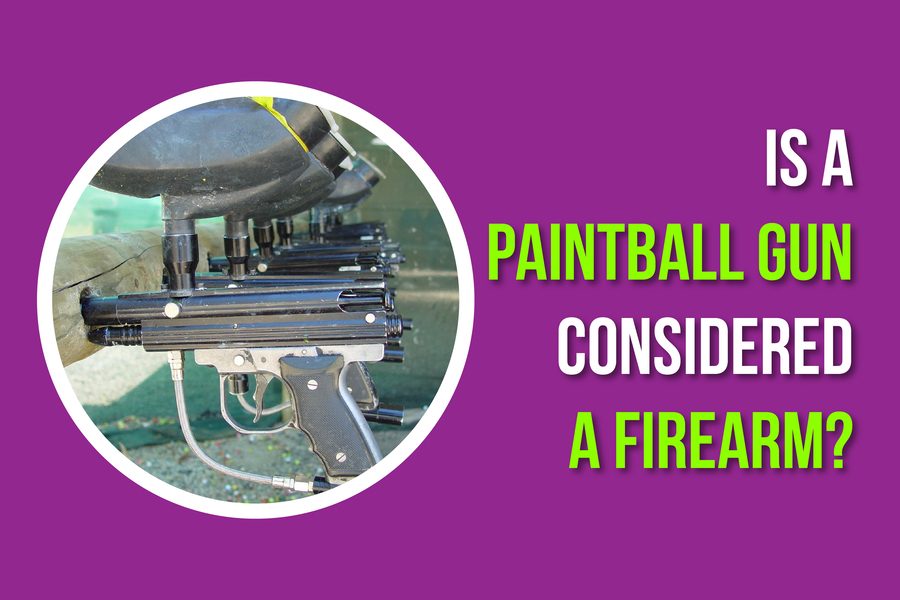Paintball guns are popular recreational devices in competitive sports and outdoor games. However, there is often confusion regarding their classification as firearms.
The question, “Is a paintball gun considered a firearm?” has been a topic of debate among paintball enthusiasts, and with this article, we hope to bring the debate to a close.
To determine whether paintball guns fall under the definition of a firearm, we need to understand the definition and characteristics of firearms and examine the legal framework surrounding them.
Only then will we be able to answer the question, is a paintball gun considered a firearm?
According to the ATF (Bureau of Alcohol, Tobacco, Firearms and Explosives), a firearm is any portable weapon that expels a projectile through an explosive reaction. A paintball gun does not fit this description; thus, it’s not considered a weapon.
However, in some states like New Jersey and New York, paintball guns are considered weapons, and several laws govern their ownership and usage.
Thus, if you live in any of these states, you must follow the same procedures for purchasing and owning a paintball gun as you would for a handgun.
While not classified as a firearm under federal law, a paintball gun is considered a weapon in New Jersey due to its potential for causing bodily harm.
Consequently, individuals, including children, who mistakenly believe they are engaging in harmless play with a toy gun could unknowingly be exposed to legal consequences such as charges for illegal possession of a weapon with malicious intent.
In California, using a paintball gun to shoot someone without their consent or knowledge outside of an authorized playing area can be interpreted as assault and may lead to penalties.
Paintball Gun Vs. Actual Firearm
While both may appear similar on the surface, they serve vastly different purposes and possess contrasting levels of power and lethality. Check out in the below table how the two compare.
| Paintball Guns | Actual Firearms | |
| Purpose | Recreational sports are not intended for self-defense. | Primarily designed for self-defense and sport shooting. |
| Legal Status | Generally unregulated for adults in most states. | Heavily regulated, requiring background checks and permits. |
| Lethality | Non-lethal; use compressed air to propel paintballs. | Lethal; designed to fire live ammunition. |
| Stopping Power | Limited impact, non-lethal, may not stop an attacker effectively. | Capable of incapacitating or stopping a threat effectively. |
| Range and Accuracy | Limited range and accuracy, suitable for recreational play. | Varies based on firearm type; generally designed for precision. |
| Ammunition | Paint-filled pellets, non-lethal and biodegradable. | Live ammunition, capable of causing serious injury or death. |
| Training and Skill Level | Beginner-friendly; minimal training required for basic use. | Requires significant training and proficiency to handle safely. |
| Legal Consequences | Generally no legal consequences for standard use in designated areas. | Strict legal consequences; misuse may lead to criminal charges. |
| Public Perception | Generally viewed as recreational and safe when used responsibly. | Mixed public perception; controversy around gun ownership and use. |
| Regulations on Purchase | Few regulations; generally available for purchase without background checks. | Stringent regulations, background checks, and waiting periods apply. |
Is There Minimum Age Requirement For Paintball Guns?
This question often arises when individuals are interested in participating in the thrilling sport of paintball.
Understanding the age restrictions is important to ensuring safety and compliance with regulations. So, what is the minimum age to wield a paintball gun?
The age restrictions for accessing a paintball gun vary depending on state law, local regulations, insurance requirements, and the preferences of individual players.
In certain US states, there are no specific age limits in place. However, it is generally recommended that individuals age 18 years or older participate in conventional paintball and 8 years old for Low Impact Paintball.
Some states classify paintball as a firearm and require individuals at least 18 to access a paintball gun.
For instance, New York prohibits those under 18 from accessing such equipment, whereas Connecticut allows minors under 18 to play under the guidance of their parents at home.
In Illinois, certain parks have set an age restriction of at least 10 years old, but the state assembly has established an age limit of 13.
In New Hampshire, the parks offer low-impact paintball opportunities for kids as young as 9. However, players under 18 must obtain a signed consent form from their parents.
Suggested reading: How to Win at paintball
Is a License Required to Own a Paintball Gun?
The requirement for a license depends on the state in which you reside or plan to play paintball. In certain regions, like New Jersey and New York, where a paintball gun is classified as a weapon, obtaining a permit or license is necessary.
Generally, jurisdictions that deem paintball guns as weapons will likely require you to acquire a license before owning one.
Additionally, depending on the state in which you plan to use a paintball gun, there may be other standards that you must meet. Some states may mandate that you complete and submit a certificate from a firearms safety course. Check out our guide on how to use a paintball gun.
Using Paintball Gun For Self-Defense
While it may seem unconventional, paintball can be used as self-defense in certain situations. And what’s good about it is that it provides a non-lethal means of incapacitating an attacker.
The paintball markers used in the sport are designed to be safe and do not cause any serious harm to the person being shot. This makes it a suitable option for individuals who do not want to use lethal force but still need a way to protect themselves.
In terms of self-defense, using paintball can be effective in several ways. Firstly, the impact of a paintball hitting the body can cause pain and momentarily stun an attacker.
This can create an opportunity for you to escape or seek help. In this way, paintball can act as a non-lethal force that can help defend against an assailant without causing long-lasting harm.
However, there are also some drawbacks to using paintball for self-defense. One major limitation is that paintball markers have a limited range and accuracy compared to traditional firearms.
For paintball to be effective, the attacker must be within proximity, which adds danger to the whole situation.
Additionally, the effectiveness of paintball as a self-defense tool relies heavily on the element of surprise and the ability to accurately shoot an attacker in a vulnerable area, such as the face or exposed skin.
This can be challenging in high-stress situations where adrenaline runs high, and motor skills may be impaired.
Another drawback of relying on paintball for self-defense is that it may not always be perceived as a credible threat by an attacker.
Since paintball markers are often associated with recreational play, an assailant may not take them seriously and may continue to pose a threat even after being shot with a paintball. This could potentially escalate the situation and put you at further risk.
Laws And Regulations Surrounding Paintball Guns
We’ve identified eight states with specific statutes governing paintball guns or paintball activities, each addressing various aspects of regulation.
- Minors’ Sales and Possession – Three states—Illinois for those under 13 and New Hampshire and Rhode Island for those under 18—regulate minors’ sales to and possession of paintball guns.
- Local Authority Ordinances – Two states empower local authorities to adopt ordinances related to paintball guns. While Delaware grants this authority exclusively to Wilmington, Virginia extends it to all local authorities.
- Usage restrictions in Illinois – Illinois prohibits using paintball guns from or across streets, sidewalks, roads, highways, public lands, or public places, except on safely constructed target ranges.
- Restrictions in Pennsylvania – Pennsylvania prohibits using paintball guns against individuals not participating in a paintball game or activity.
Additionally, the state imposes specific requirements on the transportation of paintball guns in vehicles and enforces criminal penalties for property damage caused by a paintball gun.
- School expulsion in New Hampshire – New Hampshire allows schools to expel students for possessing a paintball gun.
- Government liability limitations – In Florida and Texas, there are limitations on government liability if a government entity permits paintball activities on its property.
- Agritourism designation in Delaware – Delaware designates paintball as an agritourism activity allowed on farms.
Conclusion
After researching and analyzing the legal and technical definitions of firearms, it can be determined that a paintball gun is not considered a firearm.
While it may use compressed air to propel a projectile, it does not meet the criteria for a firearm as outlined by the ATF. Additionally, paintball guns are not regulated in the same manner as firearms.
However, it is important to note that individual states may have specific laws regarding using and owning paintball guns.

